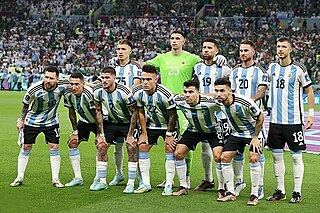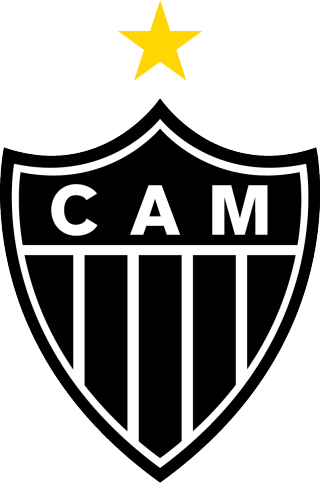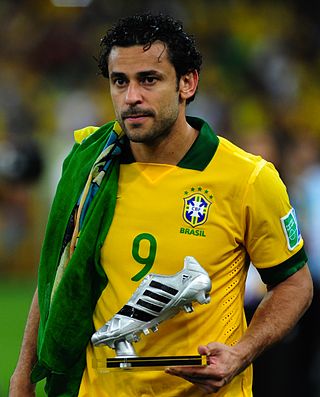Contents
A list of films produced in Brazil in 1983:
A list of films produced in Brazil in 1983:

Brazil, officially the Federative Republic of Brazil, is the largest and easternmost country in South America and Latin America. Brazil is the world's fifth-largest country by area and the seventh most populous. Its capital is Brasília, and its most populous city is São Paulo. Brazil is a federation composed of 26 states and a Federal District. It is the only country in the Americas where Portuguese is an official language. Brazil is among the world's most multicultural and ethnically diverse nations, due to over a century of mass immigration from around the world.

Fortaleza is the state capital of Ceará, located in Northeastern Brazil. It is Brazil's 4th largest city, having surpassed Salvador in 2022 census with a population of slightly over 2.4 million, and the 12th largest city by gross domestic product. It forms the core of the Fortaleza metropolitan area, which is home to almost 4 million people.

The FIFA World Cup, often called the World Cup, is an international association football competition among the senior men's national teams of the members of the Fédération Internationale de Football Association (FIFA), the sport's global governing body. The tournament has been held every four years since the inaugural tournament in 1930, with the exception of 1942 and 1946 due to the Second World War. The reigning champions are Argentina, who won their third title at the 2022 tournament.

Latin America often refers to the regions in the Americas in which Romance languages are the main languages and the culture and Empires of its peoples have had significant historical, ethnic, linguistic, and cultural impact. It is "commonly used to describe South America, plus Central America, Mexico, and most of the islands of the Caribbean". In a narrow sense, it refers to Spanish America, and often it may also include Brazil. The term "Latin America" may be used broader than Hispanic America, which specifically refers to Spanish-speaking countries; and narrower than categories such as Ibero-America, a term that refers to both Spanish and Portuguese-speaking countries from the Americas, and sometimes from Europe. It could also theoretically encompass Quebec or Louisiana where French is still spoken and are historical remnants of the French Empire in that region of the globe.

Clube Atlético Mineiro, commonly known as Atlético Mineiro and colloquially as Galo, is a professional football club of Belo Horizonte, the capital city of the Brazilian state of Minas Gerais. The team competes in the Campeonato Brasileiro Série A, the first level of Brazilian football, as well as in the Campeonato Mineiro, the top tier state league of Minas Gerais.

Blumenau is a city in Vale do Itajaí, Santa Catarina state, in the South Region of Brazil, 130 km (81 mi) from the state capital Florianópolis.

The 2014 FIFA World Cup was the 20th FIFA World Cup, the quadrennial world championship for men's national football teams organised by FIFA. It took place in Brazil from 12 June to 13 July 2014, after the country was awarded the hosting rights in 2007. It was the second time that Brazil staged the competition, the first being in 1950, and the fifth time that it was held in South America.

Sônia Maria Campos Braga is a Brazilian actress. She is known in the English-speaking world for her Golden Globe Award–nominated performances in Kiss of the Spider Woman (1985) and Moon over Parador (1988). She also received a BAFTA Award nomination in 1981 for Dona Flor and Her Two Husbands. For the 1994 television film The Burning Season, she was nominated for an Emmy Award and a third Golden Globe Award. Her other television and film credits include The Cosby Show (1986), Sex and the City (2001), American Family (2002), Alias (2005), Aquarius (2016), Bacurau (2019), and Fatima (2020). In 2020, The New York Times ranked her #24 in its list of the 25 Greatest Actors of the 21st Century.

Frederico Chaves Guedes, also known as Fred, is a Brazilian former professional footballer who played as a striker.

The Campeonato Brasileiro Série A, commonly referred to as the Brasileirão, is a Brazilian professional league for men's football clubs. At the top of the Brazilian football league system, it is the country's primary football competition. Contested by 20 clubs, it operates on a system of promotion and relegation with the Campeonato Brasileiro Série B. In 2021, the competition was chosen by the IFFHS as the strongest national league in South America as well as the strongest in the world.

The 2013 FIFA Confederations Cup was the ninth FIFA Confederations Cup, which was held in Brazil from 15 to 30 June 2013 as a prelude to the 2014 FIFA World Cup. The most recent winners of the six continental championships appeared in the tournament, along with hosts Brazil and UEFA Euro 2012 runners-up Italy, who qualified because the Euro 2012 winners, Spain, had also won the most recent FIFA World Cup in 2010 thus securing a spot in the tournament.

Argentina, officially the Argentine Republic, is a country in the southern half of South America. Argentina covers an area of 2,780,400 km2 (1,073,500 sq mi), making it the second-largest country in South America after Brazil, the fourth-largest country in the Americas, and the eighth-largest country in the world. It shares the bulk of the Southern Cone with Chile to the west, and is also bordered by Bolivia and Paraguay to the north, Brazil to the northeast, Uruguay and the South Atlantic Ocean to the east, and the Drake Passage to the south. Argentina is a federal state subdivided into twenty-three provinces, and one autonomous city, which is the federal capital and largest city of the nation, Buenos Aires. The provinces and the capital have their own constitutions, but exist under a federal system. Argentina claims sovereignty over the Falkland Islands, South Georgia and the South Sandwich Islands, the Southern Patagonian Ice Field, and a part of Antarctica.
Grupo Globo, formerly and still legally known as Organizações Globo, is a Brazilian private entertainment and mass media conglomerate based in Rio de Janeiro, Brazil. Founded in 1925 by Irineu Marinho, it is the largest media group in Latin America, and one of the world's largest media conglomerates.
The history of Brazilian animation is relatively recent. In the first half of the 20th century, there were some small experiments produced in animation without much continuity, to the emergence of several animated films in the other half of the century. The 21st century saw the advent of many animated series for television.